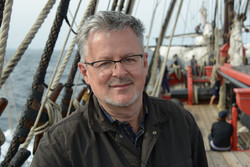Part 1: On the trail of the explorers
Terra Australis - the other end of the world. And indeed: here everything is the other way round. When it's summer in Europe, it's winter in Australia and the clocks go ten hours forward. Here, Europeans find a strange world: landscapes, animals and plants that exist nowhere else. The soil of a strange glowing red. The oldest surviving human culture on the planet, mysterious and alien. All beyond imagination.
The world-renowned Australian historian Christopher Clark, who was born in Sydney and has lived and taught in Europe for a long time, takes a look at "his" continent with both humour and criticism. Clark follows in the footsteps of the great explorers - from James Cook to Ludwig Leichhardt, who became Australia's most famous German. The result is an entertaining, surprising portrait of a fascinating part of the world in opulent pictures. It is the sheer endless expanse, the abundance of untouched, diverse nature, which time and again give rise to dreams. Or to shudder when you think that the most poisonous species of spiders and snakes are at home here and that you can encounter not only kangaroos and koalas but also crocodiles everywhere.
The rainforests of Australia that Christopher Clark visits stretch like a green ribbon along the north and east coasts; once they were much more extensive and covered almost half the continent. What remains is a unique diversity of species. And some creatures that can be found here have hardly evolved for millions of years. They found their perfect ecological niche, which has not changed either. Here, evolution is within reach. The oldest human culture on the planet has also survived here in its basic features. Until 200 years ago, only the indigenous people, the Aborigines, lived in Australia. Christopher Clark shows what has been preserved of their myths and how they live today - for example at Uluru, the sacred mountain in the middle of the continent.
In the meantime, it has become a kind of Mecca of Australia. Travelling here is something of a pilgrimage for all Australians. Uluru has thus become a point of contact between a new and an ancient Australia.
Part 2: The Last Paradise
The second part of the series takes Christopher Clark to Tasmania, among other places. He shows us the wild beauty of this offshore island, which is part of the Australian continent. And he dives off the coast of Tasmania to take a closer look at the ecosystems there. They are in danger, as is the Great Barrier Reef, a UNESCO World Heritage Site that is now highly endangered. Tasmania is also home to the "Tasmanian devil", a predator that only exists on this island and is threatened with extinction. When the first Europeans arrived, they tried to literally exterminate the indigenous people who had lived peacefully as hunter-gatherers for more than 10,000 years. Christopher Clark meets one of their present-day leaders. A dark chapter in Tasmania's history is also its time as Australia's largest convict colony. From 1833, British "criminals" were taken by ship to Port Arthur prison to serve their sentences in complete isolation. Many did not survive the physically and psychologically stressful imprisonment.
From Tasmania, the journey continues to vibrant Melbourne, which today is considered one of the most liveable metropolises in the world. The city experienced a meteoric rise during the gold rush. Here Christopher Clark also finds the roots of the multicultural society that has formed in Australia. Everyone had to survive - and live together - on this not always welcoming continent. This is not possible without solidarity. It is precisely because of the diversity of its inhabitants that equality became so important on this continent. Finally, after a detour to the spectacular coastal road "Great Ocean Road", Clark introduces us to his hometown Sydney and its eventful history.
Australia Saga – With Christopher Clark

